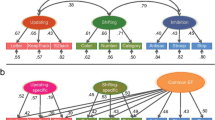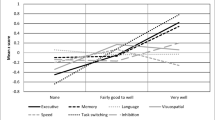Abstract
A review of the current literature regarding bilingualism demonstrates that bilingualism is linked to higher levels of controlled attention and inhibition in executive control and can protect against the decline of executive control in aging by contributing to cognitive reserve. Bilinguals may also have smaller vocabulary size and slower lexical retrieval for each language. The joint activation theory is proposed to explain these results. Older trilingual adults experience more protection against cognitive decline and children and young adults showed similar cognitive advantages to bilinguals in inhibitory control. Second language learners do not yet show cognitive changes associated with multilingualism. The Specificity Principle states that the acquisition of multiple languages is moderated by multiple factors and varies between experiences. Bilingualism and multilingualism are both associated with immigration but different types of multilingualism can develop depending on the situation. Cultural cues and language similarity also play a role in language switching and multiple language acquisition.
Similar content being viewed by others
References
Adesope OO, Lavin T, Thompson T, Ungerleider C. A systematic review and meta-analysis of the cognitive correlates of bilingualism. Rev Educ Res. 2010;80(2):207–45.
Bialystok E. Reshaping the mind: the benefits of bilingualism. Can J Exp Psychol/Rev Canadienne Psychologie Expérimentale. 2011;65(4):229.
Bialystok E. Bilingualism: the good, the bad, and the indifferent. Biling Lang Congn. 2009;12(1):3–11.
Carlson SM, Meltzoff AN. Bilingual experience and executive functioning in young children. Dev Sci. 2008;11(2):282–98.
Schroeder SR, Marian V. Cognitive consequences of trilingualism. Int J Biling. 2016. https://doi.org/10.1177/1367006916637288.
Tse CS, Altarriba J. The relationship between language proficiency and attentional control in Cantonese-English bilingual children: evidence from Simon, Simon switching, and working memory tasks. Front Psychol. 2014;5:954.
Bialystok E, Craik FI. Cognitive and linguistic processing in the bilingual mind. Curr Dir Psychol Sci. 2010;19(1):19–23.
Bialystok E, Shapero D. Ambiguous benefits: the effect of bilingualism on reversing ambiguous figures. Dev Sci. 2005;8(6):595–604.
Bialystok E, Craik FI, Luk G. Bilingualism: consequences for mind and brain. Trends Cogn Sci. 2012;16(4):240–50.
Brito N, Barr R. Influence of bilingualism on memory generalization during infancy. Dev Sci. 2012;15(6):812–6.
Ossher L, Bialystok E, Craik FI, Murphy KJ, Troyer AK. The effect of bilingualism on amnestic mild cognitive impairment. J Gerontol B Psychol Sci Soc Sci. 2012;68(1):8–12.
Christoffels IK, de Haan AM, Steenbergen L, van den Wildenberg WP, Colzato LS. Two is better than one: bilingual education promotes the flexible mind. Psychol Res. 2015;79(3):371–9.
Poarch GJ, van Hell JG. Executive functions and inhibitory control in multilingual children: evidence from second-language learners, bilinguals, and trilinguals. J Exp Child Psychol. 2012;113(4):535–51.
Chertkow H, Whitehead V, Phillips N, Wolfson C, Atherton J, Bergman H. Multilingualism (but not always bilingualism) delays the onset of Alzheimer disease: evidence from a bilingual community. Alzheimer Dis Assoc Disord. 2010;24(2):118–25.
Perquin M, Vaillant M, Schuller AM, Pastore J, Dartigues JF, Lair ML, et al., MemoVie Group. Lifelong exposure to multilingualism: new evidence to support cognitive reserve hypothesis. PloS one. 2013;8(4, e62030)
Costa A, Hernández M, Sebastián-Gallés N. Bilingualism aids conflict resolution: evidence from the ANT task. Cognition. 2008;106(1):59–86.
Kroll JF, McClain R. What bilinguals tell us about culture, cognition, and language. Proc Natl Acad Sci. 2013;110(28):11219–20.
McCabe A, Tamis-LeMonda CS, Bornstein MH, Cates CB, Golinkoff R, Guerra AW, et al. Multilingual children. Soc Pol Rep. 2013;27(4):2014–0451.
Bosch L, Sebastián-Gallés N. Simultaneous bilingualism and the perception of a language-specific vowel contrast in the first year of life. Lang Speech. 2003;46(2–3):217–43.
Sebastián-Gallés N, Albareda-Castellot B, Weikum WM, Werker JF. A bilingual advantage in visual language discrimination in infancy. Psychol Sci 2012;23(9):994–9.
Author information
Authors and Affiliations
Corresponding author
Ethics declarations
Conflict of Interest
Cibel Quinteros Baumgart declares that she has no conflict of interest. Stephen Bates Billick declares that he has no conflict of interest.
Ethical Approval
This article does not contain any studies with human participants or animals performed by any of the authors.
Rights and permissions
About this article
Cite this article
Quinteros Baumgart, C., Billick, S.B. Positive Cognitive Effects of Bilingualism and Multilingualism on Cerebral Function: a Review. Psychiatr Q 89, 273–283 (2018). https://doi.org/10.1007/s11126-017-9532-9
Published:
Issue Date:
DOI: https://doi.org/10.1007/s11126-017-9532-9




